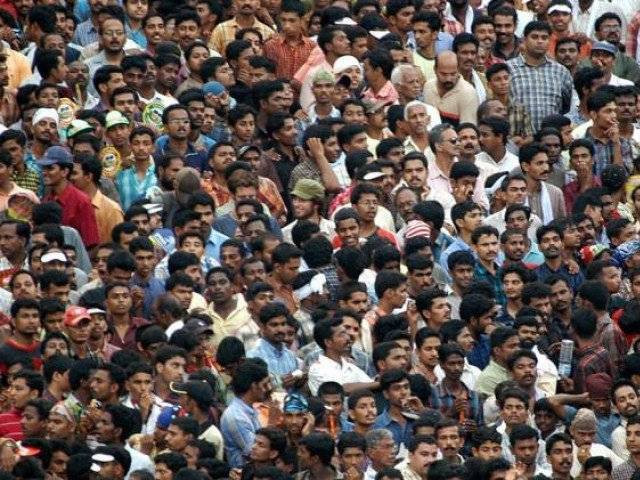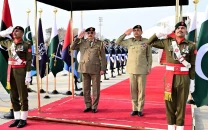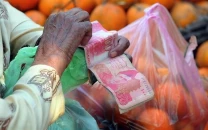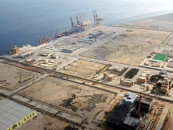Census next month at any cost: chief statistician
Detailed schedule for long-overdue national headcount unveiled

Decrying tampering with census data, they explain importance of the exercise. PHOTO: FILE
“The security situation [in the country] has deteriorated over this week and we pray it does not get any worse,” said Asif Bajwa at a session organised to brief the media about the upcoming exercise. “But there is no ‘plan B’. We are on our way to hit the ground on March 15. The census will be held at any cost,” he told reporters.
Vested interests: Certain elements resisted census, say experts
Bajwa said having a Computerised National Identity Card (CNIC) was not compulsory for one to be counted during the census. “Every living soul in Pakistan will be counted on March 18.” However, he assured there is a special mechanism to screen out Afghan refugees.
The army will have its own form — interestingly called form 786 — which will register the details of foreigners. The PBS form mentions only Pakistani or other nationality. But the army will ask foreigner’s the name of their country of origin.
Those who refuse to participate in the national headcount will be liable to pay a Rs50,000 fine and serve a six-month prison term, said PBS Member Census and Survey Habibullah Khan. He said a summary has been sent to the law ministry to give enumerators judicial powers to punish at the spot those who refuse to provide information.
Census 2017: Workshop for master trainers begins
Bajwa said the Pakistan Army was fully committed to providing requisite security through its 200,000 strong force. About 42,000 personnel will perform the role of enumerators while rest of them will provide security. In addition to that, police officials will be asked to ensure no untoward incident takes place while the exercise is carried out in Karachi.
Overseas Pakistanis will not be counted if they are not present on March 18. The exercise will cost Rs30.2 billion, of which Rs22.2 billion will go to the army.
Bajwa vowed that the individual data of the citizens will be confidential and cannot even share with the courts. While responding to a question, Bajwa said that the information regarding employment, migration, disability and birth would be collected from households after completion of the population census. He said that due to paucity of time and scarcity of human resource, the Council of Common Interests decided pending this exercise.
Habibullah said that there was no column for temporarily displaced persons (TDPs) as, according to the Fata Secretariat, all of them had returned to their homes by December 2016.
In order to address concerns about the Afghan refugees, provincial government representatives will accompany the enumerators in Afghan concentration areas.
Headcount schedule
The exercise will begin with house-listing on March 15 and will be completed in two phases. The first phase of house-listing will end on March 17, following which census forms — tagged as Form-2 — will be filled from March 18 to 27. Homeless people will be counted on March 28.
March 29 and 30 have been reserved for retrieval of filled forms and issuance of census material for phase two. House-listing in the second phase will be conducted on April 2 and will followed by filling of forms from April 3 to 12. April 13 has been reserved to count the homeless population. Enumerators will submit these documents to PBS on April 14.
The summary results of the census, comprising district-wise population details, urban-rural population and male-female ratio will be ready by July 25. Initial results of census will be released by August 5.
The summary results will be given to the Election Commission of Pakistan for delimitation of the constituencies, said Bajwa. The PBS Member Census hoped that the ECP would accept these results as official results.
District breakdown
Districts to be covered in the first phase are Karachi West, Karachi South, Karachi East, Korangi, Karachi Central, Malir, Hyderabad and Ghotki in Sindh; Quetta, Quetta Cantonment, Pishin, Musa Khel, Lehri, Kohlu, Dera Bugti, Jaffarabad,, Nasirabad, Kalat, Awaran, Kharan, Washuk, Lesbela, Kech/Turbat and Nushki in Balochistan; Peshawar, Mardan, Swabi, Charsadda, Nowshera, Lakki Marwat, Dera Ismail Khan, Hangu, Abbotabad, Haripur, Mansehra and Orakzai Agency in K-P and Fata; Jhang, Chiniot, Faisalabad, Toba Tek Singh, Dera Ghazi Khan, Rajanpur, Layyah, Muzzafargarh, Lahore, Hafizabad, Narowal, Sialkot, Vehari and Bahawalpur in Punjab; and Muzaffarabad, Bagh, Sudhnoti, Kotli and Bhimber in AJK.
All other districts and Gilgit-Baltistan will be covered in the second phase.
Orphanages, old homes, hostels and seminaries will be counted as combined homes. In case no one is available at a certain house, the enumerator will continue to visit it for 10 days. If no contact is made still, the enumerator will fill information based on feedback from neighbors.
The census exercise would help capture some interesting socio-economic patterns in addition to providing information about the number of people living in Pakistan. The maximum age limit for counting people is 85 years. The followers of five religions — Muslim, Christian, Hindu, Qadiani/Ahmadi and Scheduled Caste – will be counted. The rest will be categorised in others. Sikh religion followers are not among the five. People will have options to tick one of 10 languages as native language. The questioner form will also capture data about level of education.
Published in The Express Tribune, February 19th, 2017.



















COMMENTS
Comments are moderated and generally will be posted if they are on-topic and not abusive.
For more information, please see our Comments FAQ